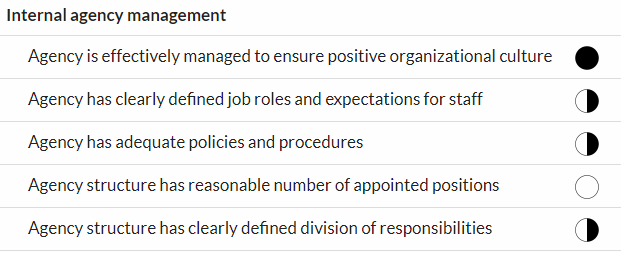Operations and Performance of Virginia’s Department of Elections

WHY WE DID THIS STUDY
In 2017 the Joint Legislative Audit and Review Commission (JLARC) directed its staff to study the operations and performance of the Virginia Department of Elections.
ABOUT THE VIRGINIA DEPARTMENT OF ELECTIONS
The Virginia Department of Elections (ELECT) is responsible for supervising the local administration of elections in Virginia. Elections are administered by general registrars and local electoral boards, which are responsible for operating polling locations on election day and for numerous other functions during the rest of the year.
WHAT WE FOUND
Virginia uses a fairly robust process to maintain its voter registration list, but can further improve process and guidance
Maintaining the accuracy of Virginia’s list of 5.5 million registered voters is critically important, but also extremely difficult. The dynamic nature of the registration list makes it extremely difficult to maintain a completely accurate list and to reliably quantify the accuracy of the list.
However, available evidence suggests the list is likely mostly accurate because (1) most individuals on the list are the same from year to year, and (2) ELECT uses fairly comprehensive sources and robust procedures to maintain the list. ELECT does not, though, make full use of available data sources to fully ensure the accuracy of the list. ELECT has historically allocated less than one staff position to maintaining the registration list. ELECT also has not provided adequate guidance to the 133 general registrars about how to decide whether to add or remove a voter from the list.

IT system maintained by ELECT is not sufficiently functional or reliable
The state’s IT system (VERIS) used to maintain the voter registration list and interact with general registrars is not sufficiently functional or reliable. The system does not provide all of the functionality registrars need to administer elections effectively. The system has longstanding reliability problems that continue to slow processing speed during peak usage.
ELECT requested and is now receiving from the General Assembly an additional $1 million annually from FY18 through FY22 to improve the system. However, many of the major improvements have yet to be implemented. More broadly, the decision in FY17 to rebuild rather than replace the system did not adequately consider several key factors. Several other states are also rebuilding or replacing their elections IT systems to address the same challenges facing VERIS.

ELECT’s oversight does not provide full assurance of election integrity and uniformity, though guidance and training is generally useful
To be effective, state supervision of local election administration should consist of meaningful oversight, and guidance and training for local elections officials to ensure that elections are conducted with integrity and uniformity. ELECT conducts a few oversight activities to ensure that elections are effectively administered. However, it does not adequately focus on overseeing the local functions that, if not performed properly, pose a risk to uniform and legally compliant elections in Virginia. For example, ELECT oversight has not sufficiently focused on key functions such as assigning voters to legislative districts and precincts, or precinct operations on elections day.
ELECT generally provides useful guidance and training to help general registrars administer elections, but some material has not been timely, correct, or sufficient to address questions from registrars. The current commissioner is taking several positive steps to address these deficiencies.

ELECT has lacked continuity of leadership and is susceptible to political influence
Under the previous commissioner, there were significant concerns about inadequate management, lack of strategic leadership, and political bias, according to ELECT staff. Under the current commissioner, management has improved. However, the recent improvements are at risk due to the lack of continuity of leadership across administrations. ELECT has three appointed positions—more than many other agencies—and the top three leadership positions traditionally turn over with each administration. In addition, ELECT lacks a classified position to ensure continuity of operations across administrations. Further, because the number of political appointees is unusually high, ELECT continues to be susceptible to political influence.

WHAT WE RECOMMEND
Recommendations
- Withhold additional funding for VERIS pending satisfactory status report on system improvements
- Direct ELECT and VITA to hire a third party to conduct a comprehensive assessment of the feasibility, costs, and benefits of replacing VERIS
- Direct ELECT to develop a plan to provide greater oversight of election integrity and uniformity
- Direct ELECT to create a permanent, full-time director of operations position to be filled by a classified employee
- Eliminate the appointed positions of chief deputy commissioner and confidential policy advisor
Executive action
- Work with DMV and experts, and allocate at least one full time staff position, to improve maintenance of the voter registration list
- Improve the written guidance and training to general registrars on topics such as adding or removing voters from the registration list, and assigning voters to precincts
- Consolidate the Election Services and Community Relations divisions
The complete list of recommendations and options is available here.

